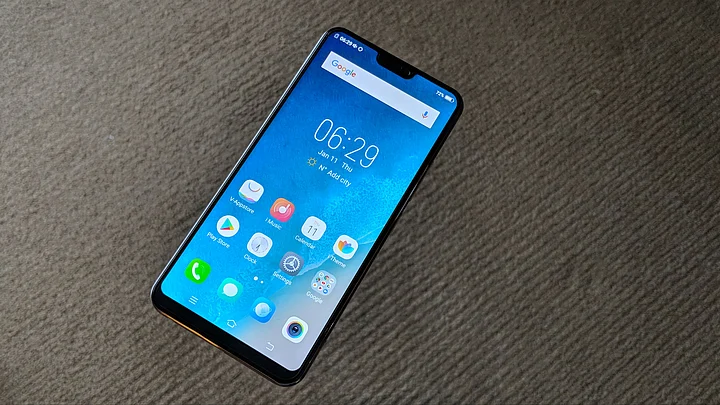Vivo’s V9 phone has been launched in India for Rs 22,990 and will be available from 2 April. The phone comes in three colour options; black, blue and gold, and it’s the first Android phone with an iPhone X-like notch as you can see in the video.
But what’s so interesting about this product, and what does it offer at this price? We tell you everything with our first impressions of the Vivo V9.
Design
Yes, the notch is the big highlight of the phone, and that says a lot about how skewed design benchmarks have become. The Vivo V9 carries a 6.3-inch screen size, that, according to the company, feels smaller like a 5.9-inch sized device. The 90 percent screen ratio has become a reality with the notch, but still not sure of its requirement.
The overall design of the phone at the back is pretty basic, with the fingerprint scanner placed right above the Vivo badge. They haven’t gone metallic with the V9, but the rounded edges, along with its sleek finishing, compensates for that. The phone’s sleek design offers 7.9-mm thickness, weighing 150 grams, which isn’t too bulky.
The dual rear cameras have been vertically positioned. The notch also holds up the front speaker and the front camera.
The phone gets micro USB 2.0 port for charging and data transfer, something which we feel could have been switched with USB Type C instead.
Display
This is the most important part about the Vivo V9 and worth talking about in detail is the 6.3-inch Full-HD+ display with 2280x1080 pixels. The screen offered in 19:9 ratio works out because of the notch. In terms of the quality, the display is quite bright, and works out nicely for viewing purpose.
Personally, I would have preferred Samsung’s formula of edge screen rather than phone makers going for the notch. But that’s the effect of Apple on the industry, when it launched the iPhone X with that design in 2017.
Offering the V9 with a big-sized screen and that unique design could work for those with a mid-ranged budget. After all, there aren’t many options beyond Vivo in the Rs 20,000 to Rs 30,000 segment.
Hardware and Software
Besides the screen, you’re looking at a mid-ranged phone with Snapdragon 626 processor in tow. The phone’s got 4GB RAM, with 64GB storage that can be expanded up to 256GB.
It supports Wi-Fi, Bluetooth, dual-SIM and 4G VoLTE is the standards now. Yes, it’s got a 3.5-mm audio jack too, just in case you were wondering. For battery, you’ve got a non-removable 3260mAh unit that more or less should offer you a day’s usage, if not more.
But what also pleased me about the Vivo V9 is the software version it comes with. Probably for the first time, a Vivo phone comes with the latest Android version out-of-box, over which you see the FunTouch 4.0. This Android skin has picked up its design elements from iOS and that’s not a bad thing.
Camera – Selfie Comes First
Coming to the camera of the Vivo V9, you get the duo of 16-megapixel and 5-megapixel shooters with aperture f/2.0 at the back. The primary camera is responsible for delivering detail in the image and the smaller sensor acts as the depth analyser. In simple words, the 5-megapixel unit allows you to blur the background, and add bokeh-like effects.
On the front, there’s a 24-megapixel camera which caters to your selfie needs, something that Vivo has been pushing for consistently. The company has made tall claims about embedding AI technology into its sensor, resulting in rich-quality images, as claimed by them.
We clicked a couple of pictures from the Vivo V9 to give you an idea about its quality, which for its price, could have definitely been better.
What Do We Think?
Vivo V9 is a mid-range phone that could have been priced differently. For Rs 22,990, the V9 is an affordable phone with a 19:9 ratio screen and the notch, but hardware doesn’t reek value in the market. Having said that, the Vivo V9 is playing in the 20 to 30K segment on its own, and its online-offline push could bear them the desired results.
The cameras don’t make a strong case for the price, but the selfie snapper is competent, and that’s been Vivo’s game play from day one.
And for a change, it’s good to see a Vivo phone getting the latest Android version out of the box. How does it compare with the other mid-range phones? We’ll find out soon.
(At The Quint, we question everything. Play an active role in shaping our journalism by becoming a member today.)



